|
|
|
Sort Order |
|
|
|
Items / Page
|
|
|
|
|
|
|
| Srl | Item |
| 1 |
ID:
190987
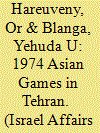

|
|
|
|
|
| Summary/Abstract |
As a close ally of Shah Muhammad Reza Pahlavi, Israel participated in the September 1974 Asian Games – the ‘Asian Olympics’ – that were held in Tehran. Among the 18 sports in which athletes competed, football attracted the most attention, especially after Iran’s historic victory over Israel in the AFC Asian Cup in 1968. As both countries reached the final of the Games’ football tournament, the match came to be seen by Iranians as nothing short of war. Standing in stark contradiction to the close and multifaceted relations between Jerusalem and the monarchical regime, this public attitude was lost on Israeli decisionmakers in what foreshadowed the failure to anticipate the Islamic revolution and the attendant collapse of Iranian-Israeli relations five years later.
|
|
|
|
|
|
|
|
|
|
|
|
|
|
|
|
| 2 |
ID:
114022


|
|
|
|
|
| Publication |
2012.
|
| Summary/Abstract |
American military institutions importantly shaped the popular sport of college football. From support at its two oldest service academies, interest in football spread through military units across the country with military actors involved in the formation of the country's first collegiate athletic conference and the National Collegiate Athletic Association. Subsequently, the US military functioned as an agent of authoritative diffusion, fostering interest in college football after the First World War. Furthermore, military institutions, including the draft, affected not only which team would be most successful during the Second World War but also how civilians would play the game. These effects call to mind Charles Tilly's work on state formation and security-driven resource extraction as well as Harold Lasswell's garrison state idea.
|
|
|
|
|
|
|
|
|
|
|
|
|
|
|
|
| 3 |
ID:
106313
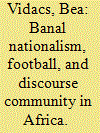

|
|
|
|
|
| Publication |
2011.
|
| Summary/Abstract |
The article argues that despite the continuing relevance of ethnicity, the idea of the nation has taken root among Africans. This is due to a combination of factors, including the universal ideology of the nation-state, the impact of the existence of such national borders on the imagination, and the influence of national symbols and icons, which naturalise the idea of the nation. Applying Michael Billig's notion of banal nationalism to Cameroon, the article focuses on linguistic practices as well as on popular appropriations of national symbols as contributing factors to the creation and maintenance of national consciousness. The analysis of a call-in radio program broadcast on Cameroonian national radio during the 1994 FIFA World Cup illustrates that football created a discourse community that reinforced the idea of the nation both explicitly and implicitly. By participating in the debate, journalists and listeners alike - regardless of the tenor of their remarks - reinforced and further contributed to imagining the Cameroonian nation.
|
|
|
|
|
|
|
|
|
|
|
|
|
|
|
|
| 4 |
ID:
172149
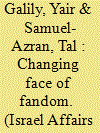

|
|
|
|
|
| Summary/Abstract |
The article seeks to document the changing patterns in football fandom over the past three decades, since the advent of the so-called era of globalisation, using the case study of Israel. It shows how, in line with global trends, Israeli fans moved from passive following of sport clubs identified with political parties to becoming active supporters with growing involvement in the clubs’ management. The article also traces the shift from party politics to patterns of nationalism and ethnocentrism amongst sport fans. Finally, it shows how Israelis moved from fandom of local clubs to that of foreign clubs, mirroring a similar trend in other countries.
|
|
|
|
|
|
|
|
|
|
|
|
|
|
|
|
| 5 |
ID:
165961
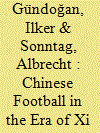

|
|
|
|
|
| Summary/Abstract |
Football has become a field of high priority for development by the central government of the People's Republic of China. After Xi Jinping took office as General Secretary of the Chinese Communist Party in 2012, a football development strategy was launched, including four “comprehensive” reforms. The purpose of this study is to examine the perceptions of these reforms by Chinese football supporters – a fundamental stakeholder group – through an online survey. Particular emphasis was laid on how nationalistic attitudes underpin supporters' expectations, especially with regard to the concept of the “Chinese Dream.” In addition, issues of football governance were also addressed.
|
|
|
|
|
|
|
|
|
|
|
|
|
|
|
|
| 6 |
ID:
172151
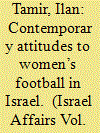

|
|
|
|
|
| Summary/Abstract |
The development in women’s sports in general, and women’s football in particular, has attracted extensive research due to, among other things, the high popularity of football, which functioned as an exclusively male domain for many years. This article examines attitudes towards women’s football in Israel, reflected in readers’ comments to related sport news items. Analysis of the responses to all the items related to women’s football posted in 2019 on sports and news websites, reveals mechanisms of fierce resistance manifested in disparaging and degrading attitudes towards women’s football and all factors involved in this sport. Some commenters emphasised women’s anomalous presence in football by restricting women to roles in the domestic and sexual spheres, while others explained women’s presence on football pitches by obliterating the gendered nature of women’s football, even to the point of equating the women with animals and beasts. Yet others blamed women players for the discrimination they experience on the football pitches, identifying the cause as ‘feminist terror.’
|
|
|
|
|
|
|
|
|
|
|
|
|
|
|
|
| 7 |
ID:
172154
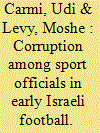

|
|
|
|
|
| Summary/Abstract |
This article explores the roots of football corruption in Israel in the first decades after independence. A socio-historical analysis of documents, correspondence, and newspaper items reveals the key role played by sports officials in corruption in the football industry. More broadly, the article shows that the historical context and a political model of commitment to political centres in which sports in Israel in general and Israeli football in particular operated constituted fertile ground for unorthodox conduct and practices that undermined the integrity of football matches. These findings challenge various theories that argue that corruption in sports has universal features that are independent of specific historical, social, cultural circumstances.
|
|
|
|
|
|
|
|
|
|
|
|
|
|
|
|
| 8 |
ID:
191909
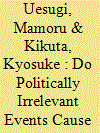

|
|
|
|
|
| Summary/Abstract |
We examine whether politically irrelevant events can cause conflicts, by analyzing the effects of professional football games in Europe on protests in Africa—an unintended spillover across the continents. By expanding psychological theories, we argue that the outcomes of the football games in Europe can affect African people's subjective evaluation of domestic politicians, which in turn can trigger protests. By exploiting as-if random variation in the results of 15,102 close football games conditional on betting odds, we find that compared to draw games, close losses of African players’ teams increase peaceful protests in their original countries while not changing the likelihood of riots or armed conflicts. The effect is particularly large for non-ethnic protests targeted at a central government. Close losses also temporarily decrease people's trust in their country's leader. By contrast, close victories do not have equivalent or compensating effects on protests or public opinion. These results suggest asymmetric misattribution: people in Africa unreasonably blame domestic politicians for bad luck in European football games, prompting protests; but they do not credit politicians with football victories.
|
|
|
|
|
|
|
|
|
|
|
|
|
|
|
|
| 9 |
ID:
172148
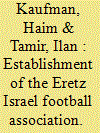

|
|
|
|
|
| Summary/Abstract |
The Eretz Israel Football Association was established on 14 August 1928 and became an official member of FIFA in May, 1929. The establishment of the Association culminated an extended process including efforts extending throughout the 1920s to institutionalise football in Eretz Israel. This article describes these efforts and the phases of institutionalising football in Eretz Israel in the 1920s; the contribution of the Russians, British, French, and Egyptians; and the rivalry between Hapoel and Maccabi, all of which ultimately contributed to the establishment of the Israel Football Association (IFA).
|
|
|
|
|
|
|
|
|
|
|
|
|
|
|
|
| 10 |
ID:
171328
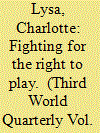

|
|
|
|
|
| Summary/Abstract |
This paper seeks to contribute to the scholarship on women and social change in Saudi Arabia through the case of female football players in Riyadh. Officially, there has been no women’s football in the kingdom, but beneath the surface women have been playing for more than a decade. The women are actively promoting and engaging in change and women’s opportunities to practise sport by building organisations, creating awareness, and negotiating norms and regulations. They are not in opposition to the regime, but supportive of reforms in favour of increased rights for women, while seeing conservative elements in the society as their opponents and the royal family as their allies. They are thus engaging in what O’Brian and Li termed ‘rightful resistance’, by deploying the language of the rulers to express their perspectives and aims, and are engaged in a three-party game with the rulers and conservatives, where divisions within the state and elite allies matter greatly.
|
|
|
|
|
|
|
|
|
|
|
|
|
|
|
|
| 11 |
ID:
105403
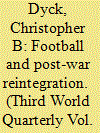

|
|
|
|
|
| Publication |
2011.
|
| Summary/Abstract |
Growing enthusiasm for 'Sport for development and peace' (sdp) projects around the world has created a much greater interest among critical scholars seeking to interrogate potential gains, extant limitations and challenges of using sport to advance 'development' and 'peace' in Africa. Despite this interest, the role of sport in post-conflict peace building remains poorly understood. Since peace building, as a field of study, lends itself to practical approaches that seek to address underlying sources of violent conflict, it is surprising that it has neglected to take an interest in sport, especially its grassroots models. In Africa, football (soccer) in particular has a strong appeal because of its popularity and ability to mobilise individuals and communities. Through a case study on Sierra Leone, this paper focuses on sports in a particularly prominent post-civil war UN intervention-the disarmament, demobilisation and reintegration (ddr) process-to determine how ex-youth combatants, camp administrators and caregivers perceive the role and significance of sporting activities in interim care centres (iccs) or ddr camps. It argues that sporting experiences in ddr processes are fruitful microcosms for understanding nuanced forms of violence and healing among youth combatants during their reintegration process.
|
|
|
|
|
|
|
|
|
|
|
|
|
|
|
|
| 12 |
ID:
157495
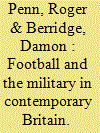

|
|
|
|
|
| Summary/Abstract |
This article examines the relationship between football (soccer) and the military in Britain to explore how “invisible nationalism” has evolved. Here, invisible nationalism refers to the phenomena by which the presence of the military at major British sporting events is both highly visual and has been rendered culturally and politically invisible: It is hidden “in plain sight.” We applied the conceptual framework associated with the “Annales” School of structuralist history to explore how the inextricable links between football, the military, the monarchy, and established church have influenced the evolution of invisible nationalism. We conducted ethnographic fieldwork, including observations, interviews, and focus groups, and also analyzed visual data. These comprised television broadcasts of national sporting events and figures taken at English football clubs. We conclude that the power of the dominant metanarratives of British nationalism serves to render these phenomena invisible to most spectators, especially those who consume football via television.
|
|
|
|
|
|
|
|
|
|
|
|
|
|
|
|
| 13 |
ID:
160077
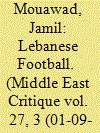

|
|
|
|
|
| Summary/Abstract |
The growing literature on sports in Lebanon tends to portray football as often implicated in the production of sectarian belonging and national disintegration. This article lays out key features of the complex politicization of sports in Lebanon vis-à-vis the discourse of national unity. It shows how the ruling elite uses sports to reaffirm its position as custodian of the hegemonic discourse of national unity that revolves around religious communities living together. It further demonstrates how normal citizens through everyday practices, and when not under the dominion of the elites, tend to ‘imagine from below’ a country that is not only powerful and defiant but also able to compete with the very countries that reputedly interfere in its domestic politics.
|
|
|
|
|
|
|
|
|
|
|
|
|
|
|
|
| 14 |
ID:
172147
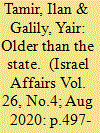

|
|
|
|
|
| Summary/Abstract |
In May 1929, the Israel Football association was officially recognised by international sport organisations, after extensive political efforts. International recognition effectively institutionalised Israel’s popular sport, 1 which would eventually become not only the focus of massive interest but also a major actor in the social, economic, and political spheres of Israeli society.
|
|
|
|
|
|
|
|
|
|
|
|
|
|
|
|
| 15 |
ID:
133825
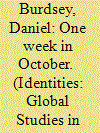

|
|
|
|
|
| Publication |
2014.
|
| Summary/Abstract |
This article explores two significant incidents of racism - involving Luis Suárez and John Terry - from the 2011-2012 English Premier League football season. In particular, it analyses and contextualises the reactions and responses articulated by key stakeholders within the football industry. Discursive themes were employed by these individuals as a means of trying to mitigate and/or exonerate the actions of Suárez and Terry, to question the veracity of the allegations made against them, and to downplay the extent and effects of racism in English football more generally. The article situates these standpoints within the wider cultural politics of race in the game and extricates the connections between discourse and structure in manifestations of racism. It demonstrates that these dominant responses are indicative of colour-blind ideology, white racial framing and the rules of racial standing. It also argues that these sporting trends are part of a wider societal shift towards racial neoliberalism.
|
|
|
|
|
|
|
|
|
|
|
|
|
|
|
|
| 16 |
ID:
152081
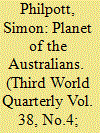

|
|
|
|
|
| Summary/Abstract |
This article examines the Australian Football League’s (AFL) diplomatic efforts to bring about recognition and reconciliation between Indigenous and non-Indigenous players, and to make a broader contribution to inter-communal relations. The AFL’s primary diplomacy has focused on classical racism, dealing with instances of on-field abuse of players by other players and with spectator education about racism and Indigenous culture in Australia. Despite successes in these areas, the AFL has notably failed to acknowledge structural, institutionalised modes of discrimination and exclusion, with the result that the sport remains deeply influenced by colonial thought and discourse concerning Indigenous Australians.
|
|
|
|
|
|
|
|
|
|
|
|
|
|
|
|
| 17 |
ID:
078250
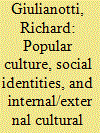

|
|
|
|
|
| Publication |
2007.
|
| Summary/Abstract |
The article examines the construction of critical, resistant identities among supporters of the powerful Scottish football club, Rangers. The analysis is underpinned by two general arguments relating to identity construction: (1) the need to examine carefully the cultural politics of relatively advantaged groups within the field of popular culture and (2) the need to explore how forms of cultural resistance and contestation are focused particularly on relations within the popular culture, rather than on forms of determination by the wider societal order. The article draws heavily on substantial fieldwork with Rangers supporters in the UK and overseas. The findings highlight the complex and contingent relationships between popular culture and broader societal forces, as illustrated by the diverging arguments of Rangers fans on the legitimacy of ethno-religious and market-focused identities within football
|
|
|
|
|
|
|
|
|
|
|
|
|
|
|
|
| 18 |
ID:
172150
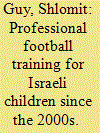

|
|
|
|
|
| Summary/Abstract |
This article offers a comparison between management systems of children and youth football departments in England and in Israel. Following a series of football disasters, the British authorities were able to reposition football as a game based on aristocratic values like integrity and delicacy and create a well-organised management system. Israeli football, which is particularly inspired by English and European football, struggles to develop similar mechanisms due to a constant state of scarcity. A new programme in Israel, the Shield of Honour, offers a new model that facilitates and motivates football managers and coaches in youth and children departments to adopt more European-like management practices.
|
|
|
|
|
|
|
|
|
|
|
|
|
|
|
|
| 19 |
ID:
112087
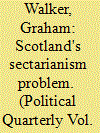

|
|
|
|
|
| Publication |
2012.
|
| Summary/Abstract |
A series of developments during the 2010-11 football season has led to an intense public debate over the question of the nature and extent of religious sectarianism in Scotland. The Scottish National Party (SNP) government has responded with a new piece of legislation which has been widely criticised and has prompted some commentators to speculate about a political 'own goal'. This article provides a guide to the debate around sectarianism and its historical and political dimensions. It also suggests that the Irish roots of the problem in Scotland should be properly acknowledged, and that a possible way forward could involve cooperation between Scotland, Northern Ireland and the Republic of Ireland within the structures and procedures of the British-Irish Council (BIC).
|
|
|
|
|
|
|
|
|
|
|
|
|
|
|
|
| 20 |
ID:
089960
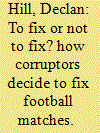

|
|
|
|
|
| Publication |
2009.
|
| Summary/Abstract |
This paper examines the decisions of the internal corruptors in fixing football games. The methodology is a mixture of interviews, database analysis and examination of a specific series of taped phone calls of a corrupt Russian football official. It finds that generally, this type of match-fixing occurs only after a specific point in the season. There are five implicit questions that corruptors must answer: is the game important enough to fix? Is it morally ethical? Can my team win honestly? Can I afford to fix the game? If I am caught is there a high risk of sanctions? The second section of the paper examines the question of who to bribe? The data indicate that out of the three possible options - referees, players and team officials - the best chance of delivering a successful fix are the team officials. The final section is an examination of the use trust, favour banks and guarantors among the team officials who are willing to sell matches.
|
|
|
|
|
|
|
|
|
|
|
|
|
|
|
|
|
|
|
|
|